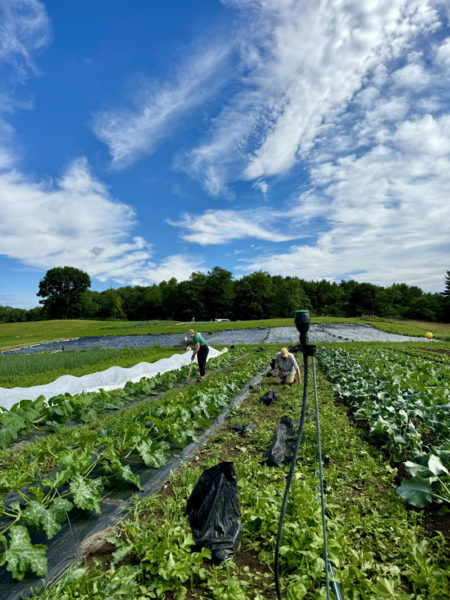
Twin Village Food Bank Farm cultivates three acres on the Salt Bay Farm in Damariscotta, donated for the purpose by property owner, Coastal Rivers Conservation Trust. (Photo courtesy Healthy Lincoln County)
Thursday mornings my coworker and I head to Twin Villages Food Bank Farm on Belvedere Road in Damariscotta for a few hours of work. We are greeted by Sara Cawthon who started this farm with her partner, Megan Taft, in the Salt Bay Farm fields donated by Coastal Rivers Conservation Trust.
There is a crew of volunteers we work with weekly. Some have been doing this for years. We plant, weed, harvest and share stories and laughter as we work together. As employees of Healthy Lincoln County, we have a tight relationship with the farm.
The farm not only supplies our share table partners with loads of veggies, they also allow us to work in their hub located in the basement of the old Darrow’s barn on the Coastal Rivers Round Top property. The hub has cold storage and lots of space for volunteers to prepare the veggies for the community. The food pantries in Lincoln County also use the walk-in and freezers at the hub.
Other local farms donate veggies to the hub for distribution in the charitable food system as well It truly is a hub and Twin Villages Food Bank Farm is certainly the center of it all.
The food grown at Twin Villages Food Bank Farm and distributed through the hub averages $2-$3 dollars a pound a season. This is amazing, especially for all of you donating funds to this farm – your dollar goes a long way to support fresh, local, nutritious food for our community.
Twin Villages Food Bank Farm runs a very efficient growing system producing and donating a lot of food per dollar. This fall the farm, in their ninth season, will have crossed 500,000 pounds grown and collected at the hub for distribution in Lincoln County.
Twin Villages Food Bank Farm improves their production efficiencies every year, mainly through using mechanized equipment and healthy soil improvements. The healthier the soil, the more food they can grow from any one bed. Soil is the number one ingredient for the most nutrient dense food.
They add 110 yards of organic compost every season. This allows the soil to be more flexible and resilient, absorbing more water in a wet year, and maintaining moisture in a dry year. A variety of minerals are added to the soil to keep the mineral contents high, which directly correlates to the availability of mineral density of the foods they grow.
In addition to all of this, Twin Villages Food Bank Farm improves their soil with cover crops when they are not in production and tests their soil biannually for minerals, Ph levels, and organic matter content.
Cawthon and her crew use tractors specifically for vegetable production, a 2-yard compost spreader, and a John Deere gator along with all the typical garden tools and lots of community hands. This thriving farm offers schools dozens of field trips and farm tours, teaching over 300 students a year about vegetables, soil, and farming.
Twin Villages Food Bank Farm fields are considered prime farmland by the state of Maine, making it an already productive vegetable soil before all their improvements. With the vast knowledge and experience of Cawthon and Taft, this top-notch efficient farm will continue to feed the community for years to come.






